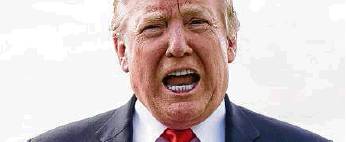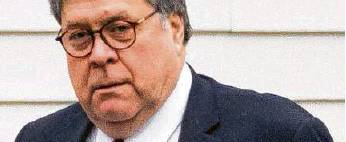Mueller report: No collusion
OBSTRUCTION: With the question of intent still undetermined, issue is left to Justice Department
By Rosalind S. Helderman and Josh Dawsey WASHINGTON POST
WASHINGTON — Special counsel Robert Mueller’s decision that he could not conclude whether President Donald Trump’s attacks on the Russia investigation amounted to obstruction of justice illustrates the difficulty in proving such a charge — and left Democrats with a narrow but fraught path to press a case against Trump.
In the end, Trump’s mercurial behavior and relentless attacks on the FBI and special counsel probably extended the length of the probe — but the fact that many of his eruptions were in public view also may have made it more difficult to show that he had ill intent, a key element in proving obstruction, legal experts said.
In his still-confidential report, Mueller stopped short of drawing a conclusion about whether the president obstructed justice, writing that “while this report does not conclude that the President committed acrime, it also does not exonerate him,” according to a summary by Attorney General William Barr, released Sunday.
“It was a complete and total exoneration.”
President Donald Trump
“While this report does not conclude that the president committed a crime, it also does not exonerate him..”
AG William Barr, quoting Mueller report
Barr went further, saying he and Deputy Attorney General Rod Rosenstein concluded that the evidence gathered by the special counsel “is not sufficient to establish that the President committed an obstruction-of-justice offense.”
That has left the question of Trump’s actions — which included the firing of FBI Director James Comey, the public attacks on then-Attorney General Jeff Sessions, the regular cries of “witch hunt” and the taunting of witnesses —as one that will now be wrestled with in the political arena.
The obstruction question, as a legal matter, came down to whether the special counsel had evidence that Trump acted with “corrupt intent” as he demeaned and demonized the investigation.
“Proving intent is genuinely difficult, because it requires you to get inside someone’s mind — and divining intent is art, not science,” said Chuck Rosenberg, a former U.S. attorney in Virginia and former counsel to Mueller.
Rosenberg said he was not surprised by the special counsel’s difficulties in drawing a conclusion on obstruction, noting that it is a complicated calculus to prove someone intended to block investigators and hide a crime.
“It was something we routinely debated, as prosecutors and agents,” he said.
In his report, Mueller addressed obstruction in an unusual way: He laid out evidence on both sides of the question but left “unresolved what the Special Counsel views as ‘difficult issues’ of law and fact,” Barr wrote in his summary. And Mueller pointedly did not clear the president.
No collusion
One major factor in the Justice Department’s analysis: Since Mueller concluded that the Trump campaign did not conspire with Russia as it interfered in the 2016 campaign, prosecutors could not argue that he acted corruptly to hide an underlying crime, legal experts said.
Prosecutors can seek a charge of obstruction when someone seeks to thwart a known criminal investigation, even if there wasn’t an underlying crime, some legal experts said, but they said it can often be difficult to then prove that case to a jury.
Compounding the challenge for Mueller was Trump’s refusal to sit for an interview in which prosecutors could have probed his motivations. Instead, his legal team only provided written answers from the president to Mueller’s questions about the campaign — not Trump’s activities in the White House.
And some of Trump’s actions — such as his firing of Comey — represented the exercise of powers afforded to the president by the Constitution, as his lawyers often argued.
To find criminal obstruction, a prosecutor must have evidence that aper-son’s actions would have the “natural and probable effect” of disrupting an investigation, said Mary McCord, former acting head of the Justice Department’s National Security Division, who oversaw the early stages of the investigation.
Barr wrote in his Sunday memo to lawmakers that Trump’s actions — many undertaken not furtively, but in full public view — didn’t reach that standard.
David Kris, who ran the national security division of the Justice Department in the Obama administration, said it was “notable” that Barr and Rosenstein came to a conclusion about the president’s actions within 48 hours of receiving Mueller’s final report, which was submitted late Friday.
“Attorney General Barr, in the space of a weekend, is able to make the judgment that Mueller precisely avoided making and described as being ‘difficult,’ ” said Kris, who now runs the consulting firm Culper Partners.
“On the merits, then, Barr and Rosenstein together have reached the question that Mueller specifically avoided reaching, and they reached it very rapidly,” he said.
Congress’ move
Mueller’s decision to not conclude whether Trump obstructed justice — followed by Barr’s quick assessment that he didn’t — now is likely to provide fodder for an already inflamed political debate about his actions as president.
“People are going to want to know what the facts were that weren’t good enough” to rise to the level of obstruction, said McCord, the former Justice Department official.
While in ordinary cases, the underlying evidence often should not be disclosed if it did not result in a charge, in the case of a high-level public official who is running for re-election next year, “the public has a right to know the facts” so they can make their own determinations about the official’s fitness to serve, she said.
In Congress, Democrats promised they would pick up where Mueller left off, insisting that they must see the special counsel’s full report — and not just the brief Barr summary of his findings — to analyze the question.
House Judiciary Committee Chairman Jerry Nadler, D-N.Y., vowed to immediately haul Barr to Capitol Hill to testify “in the near future” to explain his decision not to prosecute Trump.
Nadler, whose committee has jurisdiction over any possible impeachment proceedings, highlighted Mueller’s specific language declining to “exonerate” the president.
Those words, he said, suggested that Justice Department officials are “putting matters squarely in Congress’ court” to continue to investigate.
Likewise, House Speaker Nancy Pelosi, D-Calif., and Senate Minority Leader Charles Schumer, D-N.Y., said in a joint statement that Barr — who wrote a memo before his appointment criticizing Mueller’s obstruction investigation — was “not a neutral observer” and demanded that Mueller’s report, as well as underlying investigative material, be made public.

